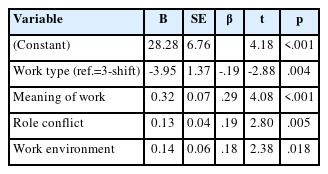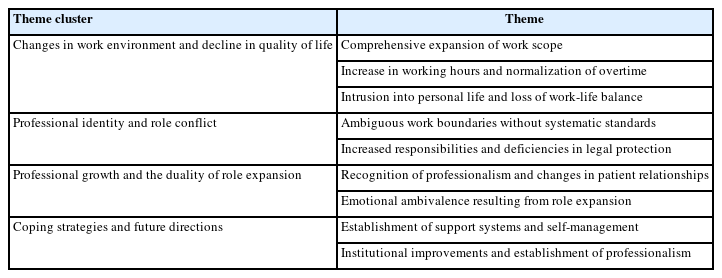| Tae Yeong Yang | 2 Articles |

Purpose
This study examined the effects of role conflict, work environment, and meaning of work on job embeddedness among physician assistants to provide foundational data for their retention and professional development. Methods: A descriptive survey was conducted with 180 physician assistants from six tertiary hospitals in Seoul and Chungcheong Province. Data were collected from July to November 2022. Role conflict, work environment, meaning of work, and job embeddedness were measured using validated scales. Data were analyzed using SAS Enterprise Guide 7.1 with descriptive statistics, the independent t-test, ANOVA, Pearson correlation coefficients, and multiple regression analysis. Results: Job embeddedness correlated positively with meaning of work (r=.28, p<.001) and work environment (r=.22, p=.002) and weakly with role conflict (r=.14, p=.045). Multiple regression identified meaning of work (B=0.32, p<.001), role conflict (B=0.13, p=.005), work environment (B=0.14, p=.018), and work type (B=-3.95, p=.004) as significant predictors (Adj. R²=19.8%). Meaning of work had the greatest impact. Conclusion: Enhancing job embeddedness among physician assistants requires improving the work environment, clarifying professional roles, and strengthening professional recognition and organizational support.

Purpose
This study explored the lived experiences of physician assistants (PAs) in Korea during the 2024 medical workforce shortage, focusing on how they perceived and adapted to their rapidly changing roles. The study investigated both the challenges PAs faced and the professional growth they experienced throughout the adaptation process. Methods: A phenomenological qualitative design was applied using Colaizzi’s method. In-depth interviews were conducted with 15 PAs at a tertiary hospital in Seoul between September 25, 2024 and February 1, 2025. Data were analyzed thematically. Results: Four major theme clusters emerged: changes in work environment and quality of life, role conflict and ambiguity in professional identity, dual aspects of role expansion including autonomy and burnout, and coping strategies and structural policy demands. Participants reported physical and emotional strain, but also described greater involvement in care decisions, improved patient relationships, and a stronger sense of professional identity. Conclusion: Amid the medical staffing crisis, PAs adapted to their expanded responsibilities and became key healthcare providers. While facing substantial burdens, they simultaneously experienced personal and professional growth. Institutional and legal support is essential to stabilize their roles and improve long-term healthcare outcomes.
|
|

